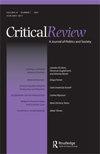德国理想主义与悲剧成熟
IF 1.7
3区 社会学
Q4 POLITICAL SCIENCE
引用次数: 0
摘要
以赛亚·伯林认为价值观冲突是悲剧性的,因为它要求为其他价值观牺牲一些价值观。他想,接受这个悲惨的事实是成熟的标志。这种观点提出了一些概念上的问题,这些问题可以归因于柏林与德国作家(康德、谢林和黑格尔)的微妙背离,这些作家创立了悲剧成熟的学说——这些人物反过来又改变了早期的观点,即启蒙是一个自然的、道德中立的成熟过程。康德将开明成熟的概念道德化,将其描述为取决于我们实现它的勇气,因此,如果我们仍然不成熟,我们要负责任。这种成熟的理论建立在这样一种观点上,这与伯林的观点是不一致的,即我们是居住在本体领域的可理解的生物,有义务行使道德自由,即使这种义务超出了我们的能力,因为我们也居住在现象领域,我们的自然倾向倾向于使我们拒绝努力履行我们的义务。然而,根据康德的观点,我们作为个体所面临的形而上学局限可以在一定程度上被超越,允许我们作为一个物种在道德上取得进步——只要我们不懒惰地坚持我们的不成熟。谢林以康德的自由概念为基础,提出了个人道德生活的悲剧性和英雄性维度,在这里,悲剧是我们注定要失败的,但在一个自然必然性的世界里,我们为实现道德自由而进行的崇高斗争。黑格尔将谢林对悲剧冲突的描述扩展到价值冲突,将这些形而上学的概念转向了一个更明显的柏林方向。但他认为最终的悲剧英雄是一种通过调和这些冲突来实现永恒正义的伦理总体,而柏林则试图否定历史总体的概念和基于经验的和解的可能性,尽管这些都是形而上学的主张。因此,伯林断言,悲剧性价值冲突是绝对的、超越历史的必然性,而这一论断的证据仅仅是他个人的信念,即在他所处的特定时间和地点,作为经验事实的问题,特定的价值在悲剧上是不可调和的。以这种方式,他非法地将冷战价值多元主义者(比如他自己)描绘成勇敢地接受价值冲突的悲剧性必然性,而马克思主义者,黑格尔和德国唯心主义的继承者,不成熟地通过拥抱完全和解的幻想来回避这一现实。本文章由计算机程序翻译,如有差异,请以英文原文为准。
German Idealism and Tragic Maturity
ABSTRACT Isaiah Berlin viewed value conflict as tragic, as it requires the sacrifice of some values for others. It is a mark of maturity, he thought, to accept this tragic truth. This view raises certain conceptual problems that can be attributed to Berlin’s subtle departures from the German authors (Kant, Schelling, and Hegel) who originated the doctrine of tragic maturity—figures who had, in turn, transformed the earlier idea that enlightenment is a natural and morally neutral process of maturation. Kant moralized the notion of enlightened maturation by portraying it as contingent on our courage to bring it about, such that we are responsible if we remain immature. This theory of maturity rested on the idea, which would have been uncongenial to Berlin, that we are intelligible creatures inhabiting the noumenal realm, duty bound to exercise moral freedom, even though this duty surpasses our ability to carry it out, as we also inhabit the phenomenal realm, where our natural inclinations tend to make us resist laboring to fulfill our duties. However, according to Kant, the metaphysical limitations we face as individuals can be transcended to an extent, allowing us to make moral progress as a species—so long as we do not lazily persist in our immaturity. Schelling built upon Kant’s notion of freedom to bring out the tragic and heroic dimension of individual moral life, where the tragedy is our doomed but noble struggle to exert moral freedom in a world of natural necessity. Hegel turned these metaphysical notions in a more recognizably Berlinian direction by extending Schelling’s account of tragic conflict to conflicts of values. But he identified the ultimate tragic hero as an ethical totality that enacts eternal justice by reconciling such conflicts, while Berlin attempted to repudiate both the notion of a historical totality and the possibility of reconciliation on empirical grounds, even though these are metaphysical claims. Thus, Berlin asserted the absolute, trans-historical necessity of tragic value conflict, while the evidence for this assertion was merely his personal conviction that in his particular time and place, specific values were, as a matter of empirical fact, tragically irreconcilable. In this manner he illicitly portrayed Cold War value pluralists (such as himself) as courageously accepting the tragic inevitability of value conflict, while Marxists, the legatees of Hegel and thus German Idealism, immaturely shrank from this reality by embracing the fantasy of total reconciliation.
求助全文
通过发布文献求助,成功后即可免费获取论文全文。
去求助
来源期刊

Critical Review
POLITICAL SCIENCE-
CiteScore
1.30
自引率
12.50%
发文量
17
期刊介绍:
Critical Review: A Journal of Politics and Society is a political-science journal dedicated to advancing political theory with an epistemological bent. Recurrent questions discussed in our pages include: How can political actors know what they need to know to effect positive social change? What are the sources of political actors’ beliefs? Are these sources reliable? Critical Review is the only journal in which the ideational determinants of political behavior are investigated empirically as well as being assessed for their normative implications. Thus, while normative political theorists are the main contributors to Critical Review, we also publish scholarship on the realities of public opinion, the media, technocratic decision making, ideological reasoning, and other empirical phenomena.
 求助内容:
求助内容: 应助结果提醒方式:
应助结果提醒方式:


